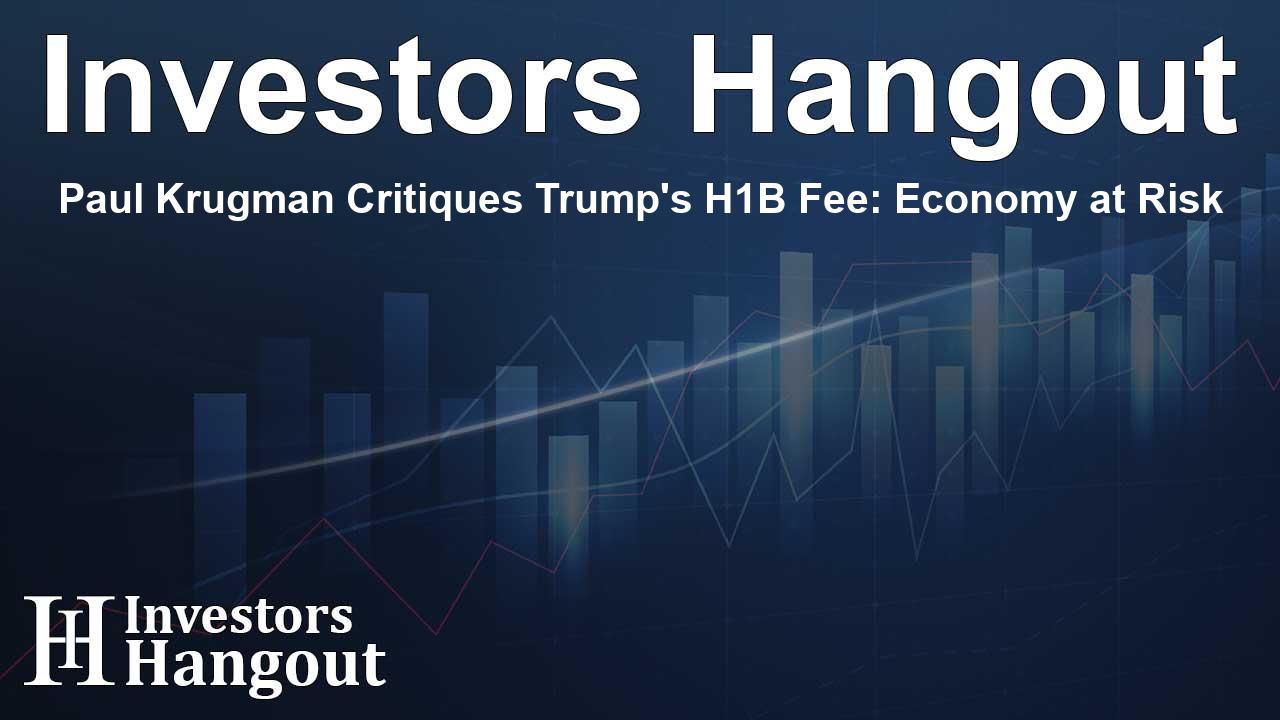Paul Krugman Critiques Trump's H1B Fee: Economy at Risk

Krugman Warns of Economic Consequences of H1B Fee
Renowned economist Paul Krugman has raised alarms regarding the significant $100,000 fee recently imposed on H-1B visa holders by President Donald Trump's administration. He emphasizes that this drastic measure could undermine the very foundations of America's economic power and technological leadership.
Understanding the Fee's Impact on Industries
In his latest newsletter, Krugman pointed out that the rollout of this fee echoed a familiar pattern of abrupt policy changes from the White House. He described how this swift announcement has sparked panic not only among skilled workers but also across various businesses, triggering concerns about the future of employment in crucial sectors.
Initial Reactions Causes Anxiety
The announcement, according to Krugman, led to immediate confusion, with many fearing for their jobs as businesses grappled with the potential increase in costs related to employing foreign talent. The administration later attempted to clarify that this fee would only apply to new applicants and not those already holding valid visas.
Echoes of a Disastrous Strategy
Krugman further articulated that this policy change is nothing short of catastrophic. He believes it jeopardizes America's standing in key areas such as technology, education, and scientific research. These sectors, he asserts, have been cornerstones of the nation’s economic success for generations.
Concerns from the Tech Community
The tech community has expressed divided opinions on this controversial fee. While some industry leaders are worried about the negative implications of discouraging skilled foreign workers, others, like Reed Hastings, co-founder of Netflix Inc. (NASDAQ: NFLX), have shown support for the overhaul. Hastings argues that the fee could ensure the program focuses solely on high-value roles, thereby reducing the need for a lottery system.
Counterarguments from Industry Experts
Nevertheless, not everyone in Silicon Valley shares Hastings’ optimism. Andrew Ng, a co-founder of Google Brain, expressed grave concerns about the fear and uncertainty this new policy instills among talented immigrants. He stressed the importance of welcoming skilled professionals into America, rather than driving them away with unpredictable changes.
Long-term Economic Effects to Consider
This policy debate raises questions about the long-term economic effects on the United States. As Krugman highlights, restricting access to skilled labor can trigger a downturn. The innovation-dependent economy risks falling into a downward spiral if the talent pool shrinks. Krugman captured this dilemma by emphasizing how it could shift from a “virtuous circle” of growth to a “vicious circle” of decline.
The Broader Implications of Trump’s Policies
The H-1B visa fee stands as part of a broader narrative regarding immigration policies under the Trump administration, which have raised significant eyebrows. Observers are left to ponder whether this is a strategic move to manage immigration or a reactionary policy that could prove detrimental to the American economy at large.
As the debate continues among economists, business leaders, and policymakers, the prevailing concern remains clear: fostering an environment that attracts and retains top talents is vital for sustaining America's economic lead.
Frequently Asked Questions
What is the significance of the H-1B visa fee?
The H-1B visa fee has significant implications for skilled foreign workers and the industries that rely on them, as it can deter top talents from coming to the U.S.
How has Paul Krugman reacted to this fee?
Paul Krugman condemns the fee, stating that it could harm American economic leadership and innovation.
What do industry leaders think about the fee?
While some support the fee for targeting high-value jobs, many express concern about its negative impact on recruitment and retention of skilled workers.
Are there any benefits to the fee policy?
Supporters argue that it may streamline the H-1B process by focusing on high-demand positions and reducing competition for lower-skilled jobs.
What economic sectors could be affected?
Key sectors such as technology, education, and research are especially vulnerable to shifts in the H-1B visa policy due to their reliance on skilled immigrant labor.
About The Author
Contact Addison Perry privately here. Or send an email with ATTN: Addison Perry as the subject to contact@investorshangout.com.
About Investors Hangout
Investors Hangout is a leading online stock forum for financial discussion and learning, offering a wide range of free tools and resources. It draws in traders of all levels, who exchange market knowledge, investigate trading tactics, and keep an eye on industry developments in real time. Featuring financial articles, stock message boards, quotes, charts, company profiles, and live news updates. Through cooperative learning and a wealth of informational resources, it helps users from novices creating their first portfolios to experts honing their techniques. Join Investors Hangout today: https://investorshangout.com/
The content of this article is based on factual, publicly available information and does not represent legal, financial, or investment advice. Investors Hangout does not offer financial advice, and the author is not a licensed financial advisor. Consult a qualified advisor before making any financial or investment decisions based on this article. This article should not be considered advice to purchase, sell, or hold any securities or other investments. If any of the material provided here is inaccurate, please contact us for corrections.
